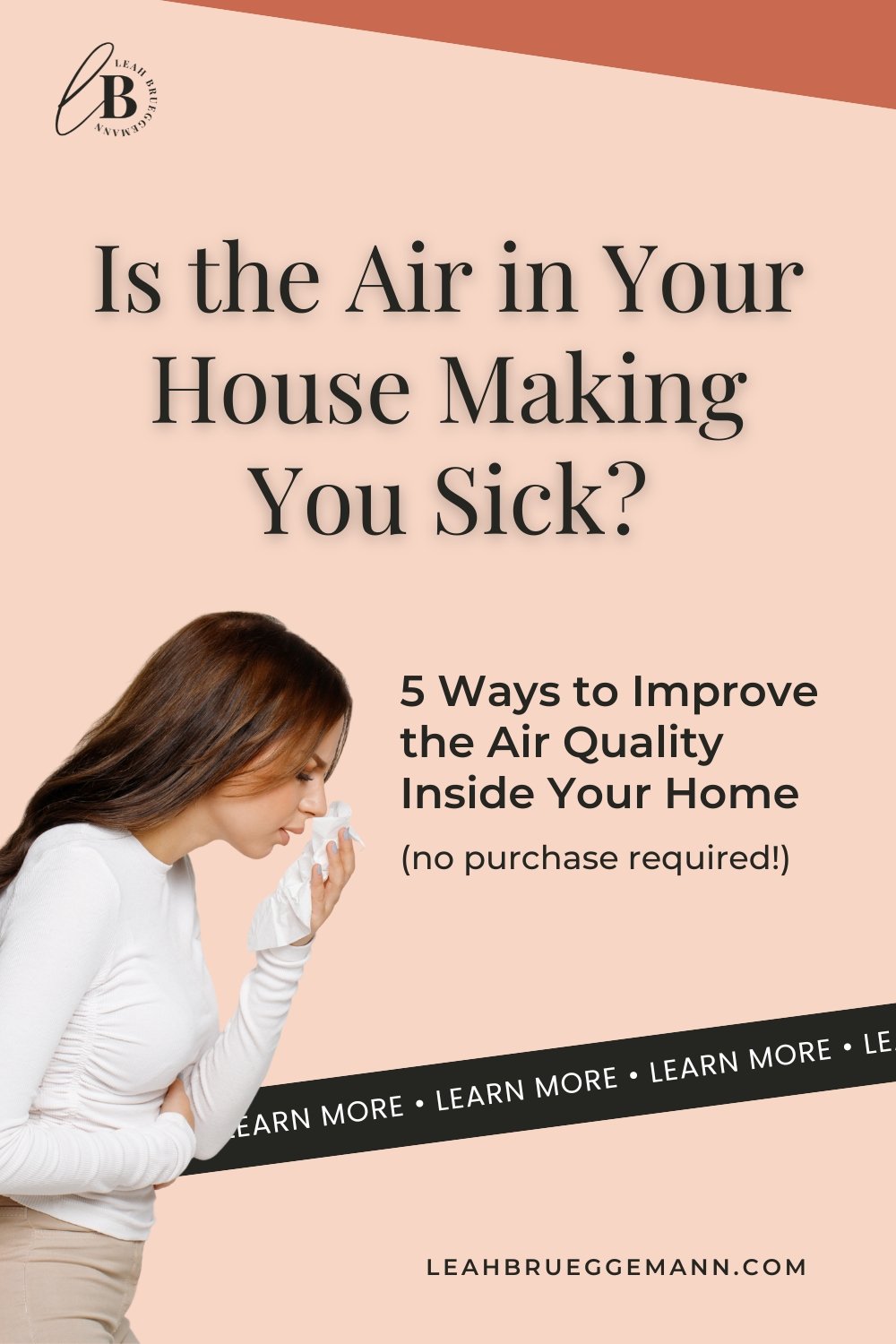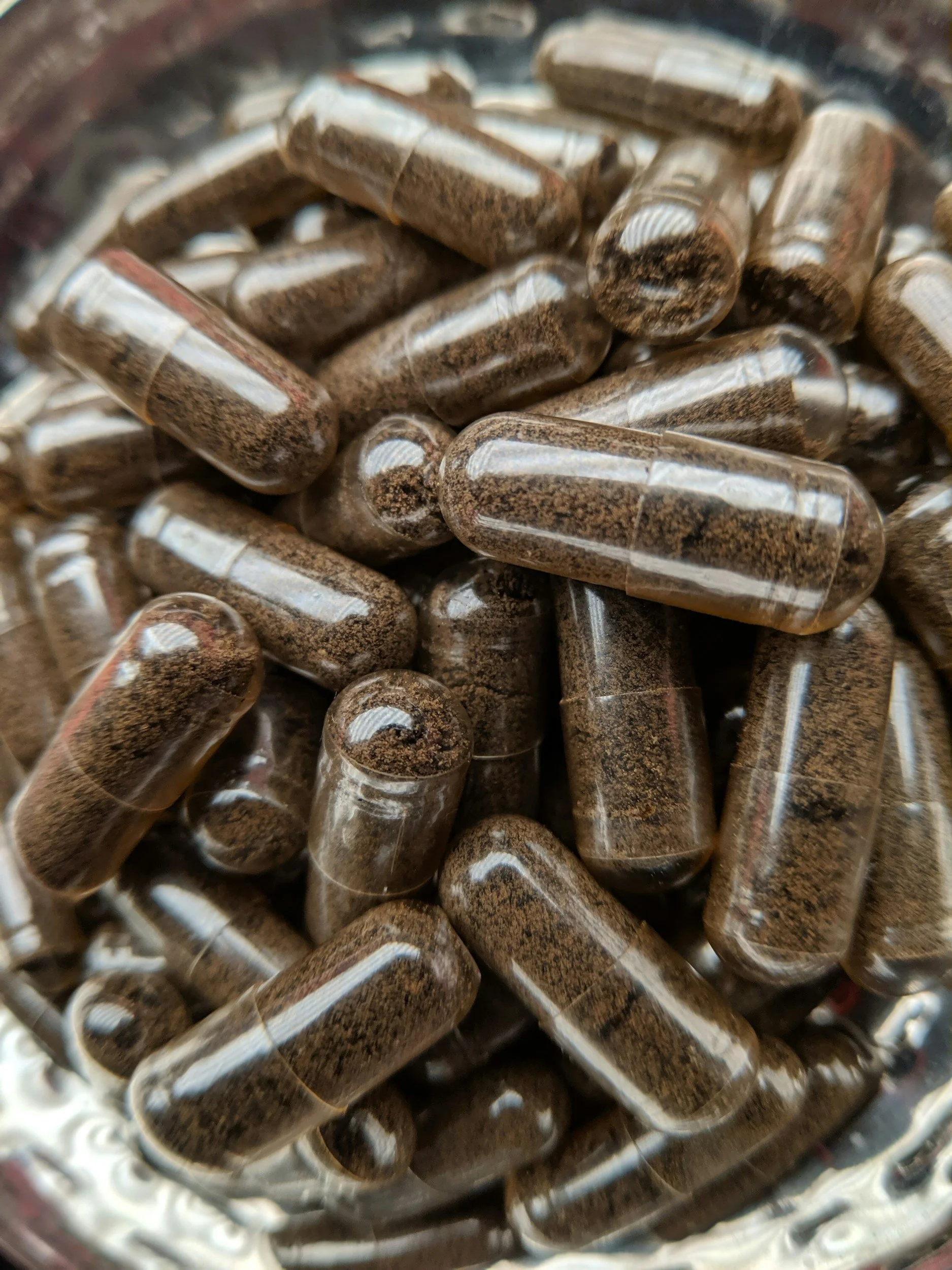Is the Air in Your Home Making You Sick? (5 Ways to Improve Air Quality)
When it comes to our health, we often focus on diet and exercise, but there's another key factor that's literally all around us: the air we breathe. I sat down with Mike Feldstein, founder of Jaspr and air quality expert to learn more about how the air quality inside your home affects your health and what you can do to improve it.
Listen to the full podcast episode here.
And don’t worry if an air purifier isn’t in the budget right now. We're kicking things off with some simple yet effective strategies anyone can implement to improve their home's air quality—no purchase required! These aren't just random tips; they're important steps that can have a real impact on your family's health and well-being.
So, let's take a deep breath and dive into the world of cleaner, healthier air! Starting with WHY you should care about the quality of the air you breathe every single day.
How Air Quality Impacts Your Health
Our bodies are great at filtering stuff, as long as it's in moderation. But these days, many (most, probably) spend a good majority of our time indoors. And the home environment was designed for thermal comfort. It keeps the rain out, the predators out, the wind out, and the temperature pretty comfortable. The downside is that it traps the air inside and most of us aren’t cleaning that air regularly. This is why we end up with health issues like inflammation, colds, allergies, and asthma, because our respiratory systems are getting overwhelmed on a daily basis by breathing in all that stale air.
A good example is when you go to someone else’s house and notice that it smells a little weird, well, within 20 minutes, or probably even less, you forget that it smells because your body adapts. But that doesn’t mean it's any less harmful for you. That’s why air quality can really be one of those sneaky things that having a huge impact on your health, even without you noticing on a daily basis.
When you're breathing in all the pollen, allergens, mold, dust mites, pet dander, etc. 24 hours a day, your body has no time to rest and recover. You guys know I talk about reducing stress all the time so that your body can rest and heal. Air quality is one of those things that stresses your system, even without us noticing it most of the time.
When it comes to our health, we often go down this rabbit hole of trying to change all our habits overnight and get all the fancy supplements, but honestly, sometimes it’s the simplest changes that can have the most immediate, noticeable effect. For example, I have clients that notice such a big difference when they start filtering their water and stop using blue light before bed. Just these basic things that feel small, like they won’t matter, can actually have a huge impact. And that’s exactly what improving air quality is like as well.
So with that in mind, let’s look at five key ways to improve your home's air quality!
5 Ways to Improve Your Indoor Air Quality
1. Take Dirty Diapers Outside Right Away
One of the big things I took away from talking with Mike, is how much I need to pay attention to the air quality in my kids' rooms! And this is just such a perfect example of something many of us parents have done without even thinking about the impact.
So, it’s super common to have a dirty diaper pail in your baby’s nursery. Obviously it’s really convenient to dispose of diapers that way and then just empty it once a week or whenever it gets full, right? But do you notice how often the room starts to smell a bit like poo whenever you walk into that room?
Those diaper pails are supposedly airtight. But if they were truly airtight, you wouldn't smell it at all. And the problem is, if you smell something it's because you're literally breathing that thing into your body—bacteria and all.
So a super easy thing anyone can do to start improving their air quality is getting those diaper pails out of their nurseries and ideally, get those dirty diapers out of the house entirely right away.
2. Stop Wearing Shoes in the House
About 95% of shoes test positive for fecal matter. Not to mention how many other toxins your shoes are picking up, like glyphosate from the grass and who knows how many chemicals from the roads, vehicles, etc. And then you spread that all over your house when you walk around with shoes on.
We all know if you touch a counter that had raw chicken sitting on it and then you lick your hand, you're probably gonna get sick. So in the same way, spreading those toxins and bacteria around your house is going to impact your health.
And you might say, well I vacuum my house all the time, so is it really that big of a deal? Yep! Vacuums might clean the surface, but then it’s actually just kicking up all that bacteria and spreading it into the air as well. So now you’re breathing it in even more. The best way to reduce spreading those toxins and keep your air cleaner is to just take your shoes off before walking around your home.
3. Open Your Windows
If temperature and outdoor air quality permits it, opening your windows is a great way to keep fresh air flowing in your house. Sometimes it's too hot, too cold, or the air quality is bad outside, but whenever possible, crack open your windows and get some air moving in your house.
4. Eliminate Toxins
Again, if you can smell something, it’s because you’re literally inhaling that thing into your body. Think about how many toxins you come across in any given day. Soap, shampoo, hairspray, perfume, makeup, laundry detergent, dryer sheets, air freshener—conventional brands are typically FULL of toxins that pollute the air inside your home. This is why I talk so much about switching to non-toxic products as much as possible, especially for the products you use on a daily basis. It has a huge impact on reducing the toxic load on your body.
Download the Switch & Ditch Guide for my favorite non-toxic products.
5. Air Ventilation
An easy step you can take to improve air ventilation in your home is check your range hood above your stove. That thing is not just for baking! No matter what you're cooking, that range hood should be on. Take a tissue, hold it up, and see if it pulls your tissue up. If it's not sucking a tissue up, it’s literally not working. So make sure your range hood is actually pulling air and working.
The reason we want to check the range hood is because when you’re cooking, a lot of secondary byproducts are created that affect your air quality. This is exacerbated when you’re using low quality food, cooking utensils, and cooking sprays. But even if you’re eating organic, grass-fed beef and cooking in cast iron or stainless steel, we still want to make sure that we’re using that range hood and ventilating the air.
Same thing with your bathroom fan. Do that tissue test again and make sure that bathroom fan is pulling it. You should hold that tissue up and it should be stuck to the fan. If it's not, then it's not working. At least 50% (and probably more) of people's range hood and bathroom fans don't work. So the first thing you should do is make sure those are actually working.
Second thing to check is if it's pulling air, see where it vents. You would be shocked how many people's range hoods vent into a cabinet, a wall cavity or their attic. It doesn't actually vent outside. So that is still affecting the air quality in your home.
Bonus: Get an Air Purifier
This is, of course, a fantastic way to improve the air quality in your home! And I want to share my experience with Jaspr air purifiers because if you’re like me, you’re probably thinking all air purifiers basically look the same and do the same thing, right?
Well, this past year, I found myself waking up with a stuffy nose a lot. I’ve never had allergies before, but I did notice we had a ton of cottonwood this past year. It was literally floating everywhere and was all over our yard. So that’s when I started waking up with a stuffy nose. But even after the cottonwood was gone, I was still waking up with a stuffy nose. I was never sick, it never turned into a cold or anything, it was just weird!
And we did have an air doctor purifier before, so when we first got Jaspr, I was thinking okay I’m really going to put this to the test and see what it does. The very first night that we had Jaspr, I woke up without a stuffy nose and I haven't woken up with a stuffy nose since.
I also noticed that since getting the Jaspr, I get really good REM sleep and my HRV at nighttime jumped up 20 points, which is saying a lot about your body's recovery. And so these things are what really sold me on the Jaspr air purifiers. I am not a super sciencey person when it comes to filters. When I look at the air doctor filter and I look at the Jaspr filter, I'm like, what's the difference? But I could literally FEEL the difference when we switched.
If you want to try the Jaspr air purifier for yourself, you can literally try it out risk free for 60 days. Meaning, if you don’t notice a profound difference in the first 60 days, they’ll take it back and give you all your money back.
Get 10% off Jaspr with code LEAH
Pro-tip: If your home needs multiple air purifiers, you can actually stack code LEAH with their regular discount for buying two or more air purifiers.
So, if you are ready to start breathing better, sleeping better, and feeling better, investing in your air quality is the place to start! Whether that means just starting to take your shoes off inside and cracking some windows open or you’re ready to jump in with an air purifier, every step is gonna get you closer to better health.
Use Code LEAH for 10% off Jaspr Air Purifiers!
Dive into the world of cleaner, healthier air to finally start breathing better, sleeping better, and feeling better.
You May Also Like…
The recommendations presented in this blog are not a substitute for medical advice from a qualified doctor. Before making any changes to your diet and lifestyle, please consult with your health care provider.
Some of these links contain affiliate links.




